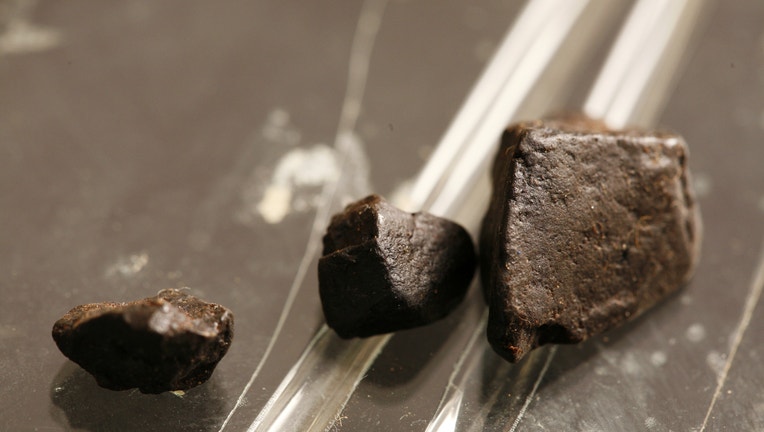Feds bust open-air drug market in Humboldt Park, charging 18

Black tar heroin (Photo by Universal Images Group via Getty Images)
CHICAGO - The feds have charged 18 men who allegedly worked at an open-air drug market in Humboldt Park, where undercover agents allegedly made about 80 purchases during a year-long investigation dubbed “Operation Monticello’s Revenge.”
Most of the men were arrested last week on charges of federal drug conspiracy in connection to the drug market in the 1000 block of North Monticello Avenue, the U.S. Attorney’s office in Chicago announced Monday.
According to a criminal complaint, Sam Howard and Kelvin Franklin worked as street-level managers of the market, coordinating the sale of fentanyl-laced heroin, and personally sold drugs to undercover officers more than a dozen times each.
Three other men — William Tate, Morrio Bonds and Antonio Lee — supplied the drugs at the market and repackaged them in aluminum foil or baggies, prosecutors said.
Thirteen other men are charged with serving as street-level traffickers who allegedly gave Howard and Franklin proceeds from the sales. The complaint lists several alleged sales made to undercover officers between March 2019 and September 2019.
In one sale April 2, an undercover officer wearing audio and video recorders approached the market and asked Howard, “You got that D?” meaning heroin, according to the complaint.
“Next block,” Howard allegedly said, pointing south down Monticello.
While the officer walked south, another person called out, “How many [blows of heroin]?”
The officer said he wanted five. “I got fifty dollars,” he said, according to the complaint.
Howard then joined the officer again and asked, “You ain’t the police, you all?”
The officer replied, “We came here last week.”
Howard, testing his customer, then asked, “What kind of blows we got?”
“Tin foil,” the officer said.
“Yeah, you know …” Howard allegedly said.
The officer then negotiated with the pair and left with three foil baggies of heroin, the complaint states.
Intercepted phone calls show the group made thousands of dollars daily from drug sales, prosecutors said.
Investigators estimate the group sold, between February 2019 and October that year, more than 12 kilograms of heroin, 16 kilograms of fentanyl-laced heroin, 7 kilograms of heroin with synthetic fentanyl, according to the complaint.
Police recorded more than 2,400 drug-related arrests at the Monticello drug spot between January 2019 and May 2020, according to prosecutors. More than 200 other arrests at the spot were for weapons. In all, more than 19,000 service calls were made by Chicago police there.
CPD’s Harrison District, which encompass the drug market, has seen steadily increasing violence in the past few years, according to official CPD statistics. Murders in the district stand at 54 this year through July 12, an increase of more than 30% since 2016.
The day after police Supt. David Brown was sworn in as the head of CPD, he ordered officers from police districts across the North Side and Northwest Side be sent to the Harrison District on the West Side — long one of the most violent areas of the city. He later apologized to aldermen who were blindsided by the swift removal officers from their wards.
In March, the Sun-Times reported that Chicago police officers were checking IDs of everyone entering certain West Side blocks known for drug sales, including Monticello Avenue, in an effort to disrupt their activities. The American Civil Liberties Union of Illinois criticized CPD’s actions, saying the enforcement raised constitution concerns “about limiting people’s movement and requiring people to ‘show papers’ to travel within Chicago.”

